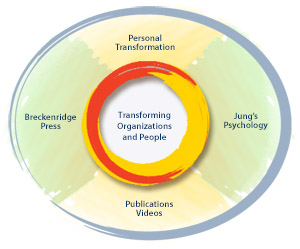 |
|
|||||||||||||||||||||
Personal Transformation 
Jung’s Psychology C. G. Jung's work has been influential in the fields of psychiatry, anthropology, archeology, literature, psychology, and religious studies. He proposed a three-part structure of the human psyche that consisted of the Ego, Personal Unconscious, and the Collective Unconscious, where the goal of the life-long process of individuation was to become the person we were meant to be – our true, authentic selves – with all three psychic levels aligned along the Ego-Self Axis. While Jung’s work explored, mapped-out, and described the unconscious elements of the psyche, his primary interest focused on the ways in which the conscious and unconscious elements of the psyche interact with each other within the larger context of the Self that encompassed the totality of the psyche. The Breckenridge Institute’s research is based on the primary and secondary sources of Jung’s work shown below. Primary Sources The Red Book, by C.G. Jung The Collected Works of C.G. Jung Memories, Dreams, Reflections, C.G. Jung Secondary Sources A Primer of Jungian Psychology, by Calvin Hall and Vernon Nordby Boundaries of the Soul, by June Singer The Symbolic Quest, by Edward Whitmont Jung: His Life and Work, by Barbara Hannah Thoughts on the Axiom of Maria, Lara Newton Encounters with the Soul, by Barbara Hannah Maps of Meaning, by Jordan Peterson Energies and Patterns in Psychological Type, by John Beebe Reflections on the Inferior Function, by Lara Newton A Jungian Approach to Organizational Development and Culture Transformation Mark Bodnarczuk has also described how Jung’s work provides insights into the theory and practice of organizational development, and organizational culture transformation. Starting with a three-level view that echoes Edgar Schein’s work, organizational culture is defined as the historical repository of an organization’s successes and failures, that over time becomes, “How it’s done around here.” For more information on a Jungian approach to organizational development and organizational culture transformation see Mark Bodnarczuk’s books that are available worldwide on websites like Amazon.com. Making Invisible Bureaucracy Visible: A Guide to Assessing and Changing Organizational Culture, by Mark Bodnarczuk Island of Excellence: 3 Powerful Strategies for Building a Culture of Creativity, by Mark Bodnarczuk Organizational Culture and Leadership, by Edgar Schein A Biblical Approach to Jung’s Psychology From an inside-out experiential perspective, we live in the three-pound universe between our ears, but it’s amazing how little people know about themselves because we are alienated from ourselves. We are also alienated from others who are alienated from themselves. Whether it’s at the personal or collective archetypal level, we are strangers to ourselves and others. A traditional Jungian view sees life as a journey along an Outer Labyrinth of the destiny that we create with our day-to-day choices, and an Inner Labyrinth of the destiny that we have that’s revealed by the unconscious Self in our dreams, with both happening together at the same time. The archetypal nature of this journey is evidenced in the work of modern thinkers like Jordan Peterson in his Maps of Meaning, as well as the underlying theme of destiny in popular movies like Forrest Gump. Much like Copernicus and Kepler swapped-out a Ptolemaic, geocentric, view of our solar system for a heliocentric view with elliptical, not circular, orbits, the Breckenridge Institute’s approach to Jung’s work swaps out Jung’s underlying belief in a two-part reality of the Spirit of the Depths and the Spirit of the Times, for a three-part ontology that consists of the Spirit of the Depths, the Spirit of the Times, and the Spirit of God Who created the universe 13.8 billion years ago in a Big Bang, as described in Genesis 1:1 and by the Word in John 1:1-5. Because the Spirit of the Depths and the Spirit of the Times are created things that can be described using natural causes, the Spirit of God can, and does, exercise God’s sovereign will and purposes along the Outer and Inner Labyrinth, with both happening together at the same time. A three-part ontology helps us recognize how God reveals Himself through historical patterns-of-transformation, as empirical evidence of His existence, sovereign power, and faithfulness to us, knowing that He is accomplishing His sovereign will through the conscious and unconscious (intended and unintended) beliefs, strategies, mind-sets, and actions of all people in all times, in all cultures, regardless of whether they recognize or know that God is using their lives, and their stories to achieve His ends, purpose, and will which cannot be thwarted (Job 42:2). For more information on how the Breckenridge Institute® can help your organization e-mail us at info@breckenridgeinstitute.com. The Breckenridge Institute® is a member of the Association of Test Publishers (APT) and the Energy Facility Contractors Group (EFCOG). The Breckenridge Institute® is a GSA approved contractor, with a MOBIS Schedule 874 and GSA Advantage Number GS10F0232L. The Breckenridge Institute’s areas of expertise are classified under NAICS Code 541611 (Management, Scientific, and Technical Consulting Services). Personality in Context®
|


